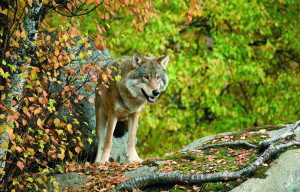Large Carnivores in Central Europe – Workshop
Fuentes del Narcea Nature Park (Spain) © Alto Narcea Muniellos Development organisation
During centuries, European large carnivores suffered dramatic declines in numbers and distribution as a consequence of human activity. Across Europe, scattered individuals and small populations survived in remote areas where human presence could be avoided.
Nowadays, the situation has changed, with most populations of brown bear, wolf, wolverine, Iberian lynx and Eurasian lynx stabilizing (even increasing) and spreading across new areas. Farmland abandonment, the growth of forest areas, the increase of prey species and the existence of favourable laws for these species are some of the reasons for their successful growth. But after so many decades without the presence of large carnivores, we have to relearn how to coexist, by increasing our cooperation with our peers to find solutions and build a dialogue with the main actors affected by their presence.
In order to tackle the current situation, the European Commission created the EU Platform on Coexistence between People and Large Carnivores, where representatives of different interests groups come together to find solutions and exchange knowledge. EUROPARC Federation has an active role in the platform, representing the interests of European Protected Areas.

Wolf © Rodopi National Park, Greece
An interesting workshop will take place between the 18th – 20th April, in Berlin, where Protected Areas can positively contribute for the debate on the coexistence between people and large carnivores.
The workshop will focus Large Carnivores in Central Europe and is organised by WWF and NABU (Birdlife Germany) under the EU Platform on Coexistence between People and Large Carnivores. The main aim of the workshop is to share ideas and best practices on monitoring and management, with specially concerning cross-border cooperation and conflict resolution between different stakeholders.
Protected Areas and organisations are invited to participate and share their experiences, and the deadline for applications is the 20th March.
Find out all details in the document below.